March 2025
The global fertility supplements market size is calculated at USD 2.42 billion in 2025 and is forecasted to reach around USD 4.85 billion by 2034, accelerating at a CAGR of 8.04% from 2025 to 2034. The North America market size surpassed USD 810 million in 2024 and is expanding at a CAGR of 8.13% during the forecast period. The market sizing and forecasts are revenue-based (USD Million/Billion), with 2024 as the base year.
The global fertility supplements market size accounted for USD 2.24 billion in 2024 and is expected to exceed around USD 4.85 billion by 2034, growing at a CAGR of 8.04% from 2025 to 2034. The growing trend of women delaying pregnancies is the key factor driving the fertility supplements market growth. Also, increasing healthcare costs coupled with advancements in the medical industry can fuel market growth soon.
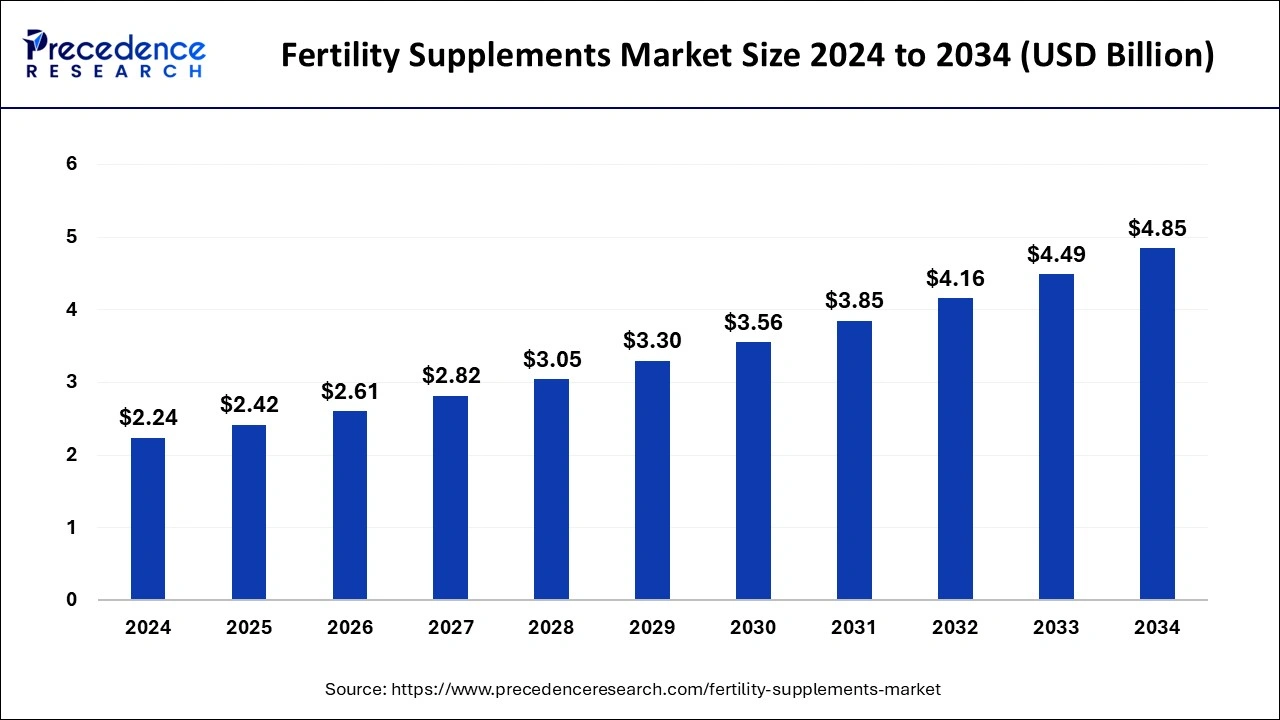
In the fertility supplements market, Artificial Intelligence tools like deep learning and machine learning improve quality control, enhance precision, and increase efficiency in processes such as sperm and embryo selection. It also decreases variability and human error, hence supporting greater success rates for in-vitro fertilization treatments. Furthermore, AI has the ability to transform IVF by streamlining the outcomes, but it requires keen management to ensure moral standards that can fulfill patients' trust.
The U.S. fertility supplements market size was evaluated at USD 640 million in 2024 and is projected to be worth around USD 1,410 Million by 2034, growing at a CAGR of 8.21% from 2025 to 2034.
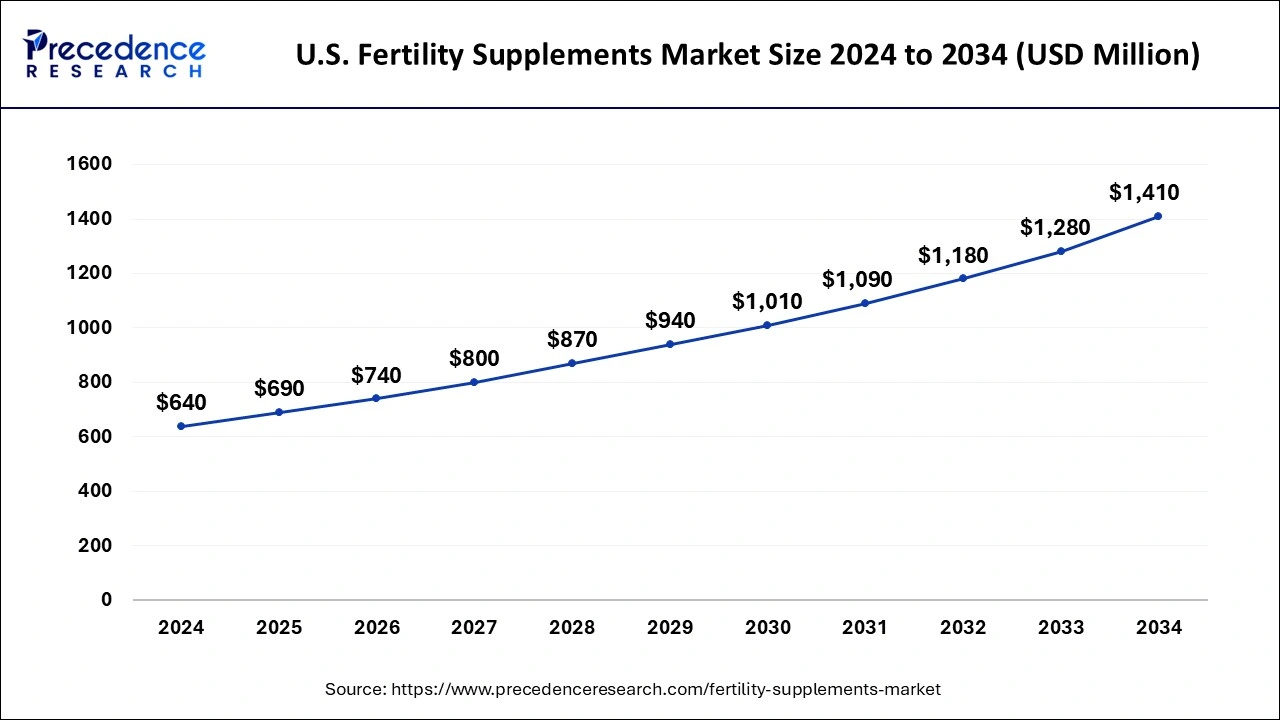
North America dominated the fertility supplements market in 2024. The dominance of the region can be attributed to the increasing infertility rate along with the growing public awareness regarding health in general. However, in North America, the U.S. led the market owing to the rising demand for organic and natural products, with the presence of a strong regulatory environment that promotes a healthy lifestyle.
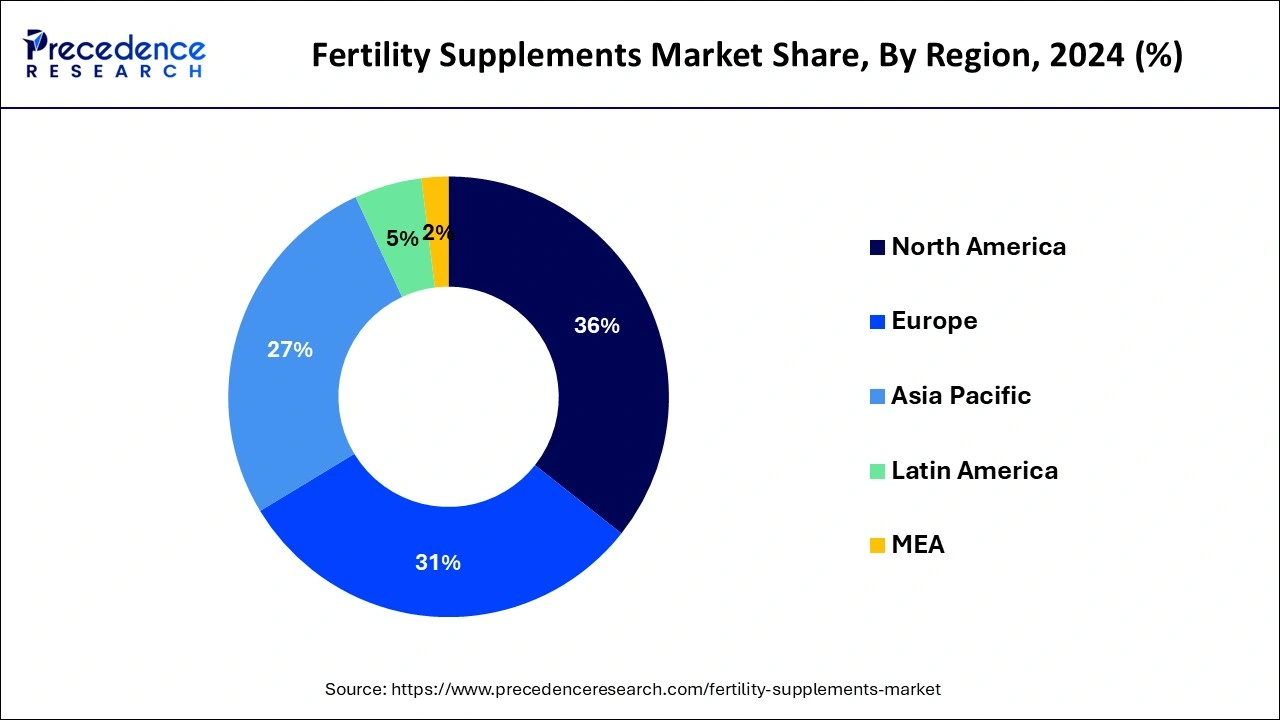
Asia Pacific is expected to show the fastest growth in the fertility supplements market over the studied period. The growth of the region can be linked to the enhanced availability and accessibility of healthcare facilities coupled with the growing investments in research and healthcare infrastructure. Furthermore, governments in developing countries are taking various initiatives to increase awareness about infertility.
Fertility supplements help to enhance hormonal profiles and increase delivery and pregnancy rates for women and men. Male infertility is mainly associated with the decreased motility of sperm and low sperm count, which can occur due to hormonal imbalance. Growing infertility has occurred because of factors like a rise in the consumption of drugs and alcohol, frequent smoking, increased stress levels, and environmental factors. Many individuals are emphasizing enhancing sexual well-being.
Top five countries by total fertility rate 2024
| Country | Total fertility rate in 2024 (births/woman) |
| Niger | 6.6 |
| Chad | 6 |
| DR Congo | 6 |
| Somalia | 6 |
| Central African Republic | 5.7 |
| Report Coverage | Details |
| Market Size by 2024 | USD 2.24 Billion |
| Market Size in 2025 | USD 2.42 Billion |
| Market Size in 2034 | USD 4.85 Billion |
| Market Growth Rate from 2025 to 2034 | CAGR of 8.04% |
| Dominating Region | North America |
| Fastest Growing Region | Asia Pacific |
| Base Year | 2024 |
| Forecast Period | 2025 to 2034 |
| Segments Covered | Ingredient, Product, End-User, Distribution Channel, and Regions. |
| Regions Covered | North America, Europe, Asia-Pacific, Latin America, and Middle East & Africa. |
Increasing demand for natural fertility treatments
Many individuals who are trying for a baby are considering natural alternatives over traditional medical treatments like IVF. The fertility supplements market can be seen as a more secure way to increase the chances of conception naturally. In addition, fertility supplements are considered an essential segment of preconception care, because they offer the body with necessary nutrients that are required for good fertility.
Low success rates
Effectivity concerns are a key constraint for the fertility supplements market. Patients may be in a state of dissonance regarding the efficiency of these products because of fluctuating results and less evidence supporting their effectiveness. Moreover, fertility supplements confront significant regulatory hurdles due to changing requirements and standards across different regions.
E-commerce development
Availability of online in recent years, fertility supplements have earned substantial attention in the men's and women's health markets because of their part in supporting reproductive health. Fertility supplements emphasize improving the functionality of the uterus, fallopian tubes, and ovaries in the female reproductive system. Furthermore, players in the fertility supplements market are strengthening their online presence to make this product accessible to all customers.
The synthetic/ blend of natural and synthetic segments dominated the fertility supplements market in 2024. The dominance of the segment can be attributed to the increasing demand for these supplements by consumers as they provide benefits of both natural and synthetic nutrients. These supplements possess a blend of natural ingredients and vitamins to assist in strengthening fertility. Additionally, vitamin C, vitamin B6, Selenium, zinc, and Myo-Inositol are the primary synthetic ingredients that are easily accessible.
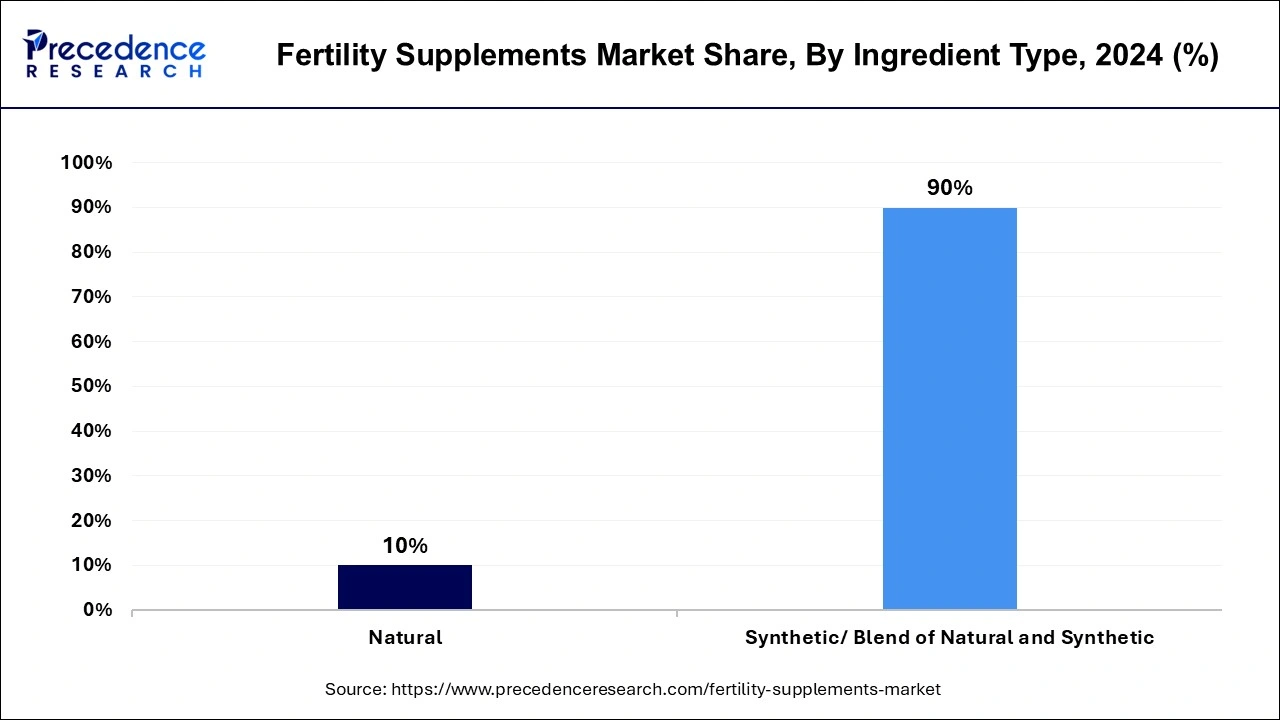
The natural segment is expected to grow at the fastest rate in the fertility supplements market over the forecast period. The growth of the segment can be linked to the ongoing technological advancements and launches of innovative products in the wellness and health industry. Also, these supplements have minimum side effects because they are direct extracts of plant-based products.
The capsule segment led the global fertility supplements market in 2024. The dominance of the segment can be credited to the increasing importance of microencapsulation in the fitness industry to monitor the color properties and ensure the fixed release of products. However, the high cost that comes with the packaging method is preventing market players from utilizing capsule formulation during the projected period.
The liquid segment is anticipated to grow at the fastest rate in the fertility supplements market over the forecast period. The growth of the segment can be driven by the increasing use of this product-type supplement in the form of smoothies or water. These supplements have a shorter shelf life than other types and also need to be refrigerated. In addition, for patients suffering from oesophageal challenges or pill ingestion, liquid supplements can be the best choice.
In September 2024, Ritual will launch the Fertility Support drink mix in a new window. The company said, "When Katerina Schneider was pregnant for the first time, she could not find a prenatal vitamin that checked all the boxes: clean, science-backed and vegan-certified.
In 2024, the women's segment dominated the global fertility supplements market. The dominance of the segment is due to the increasing infertility in women due to various external factors such as obesity, excessive drinking and smoking, etc. Hence, women who are looking to have a child can use these supplements to enhance egg quality and menstrual cycle, improving overall reproductive health.
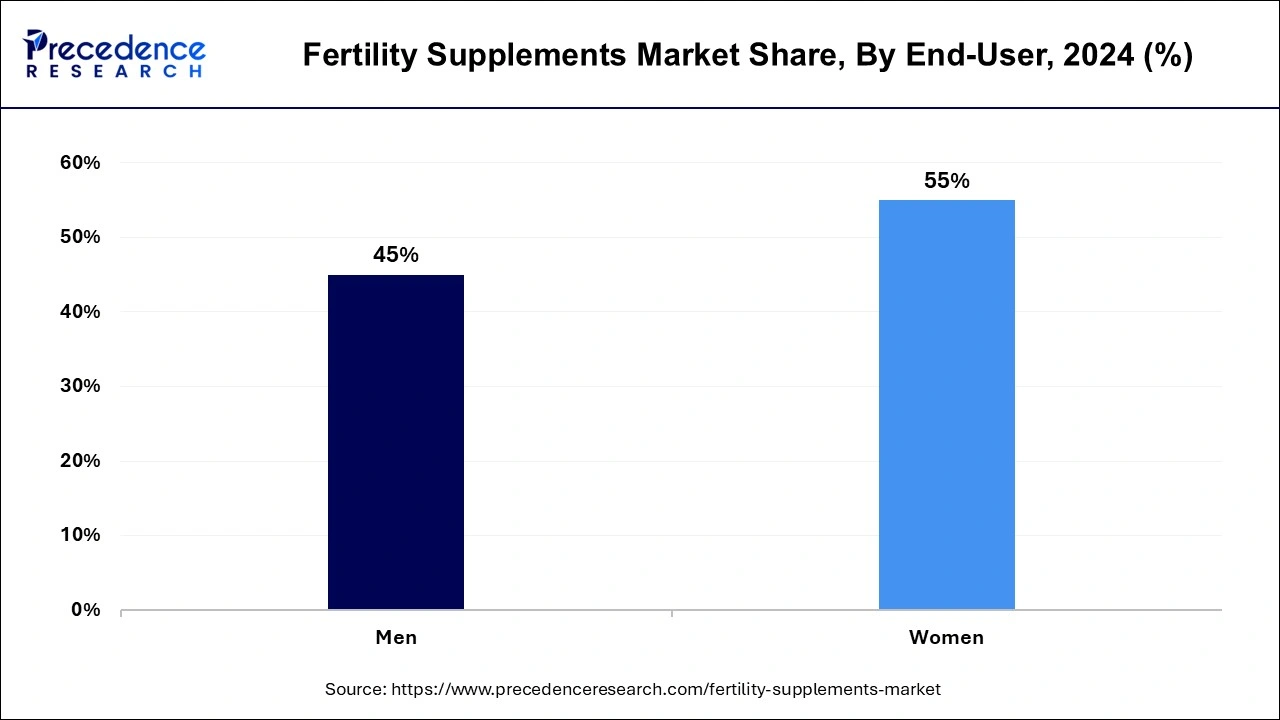
The men's segment is expected to grow at the fastest rate in the fertility supplements market during the projected period. The growth of the segment is due to the low or no sperm counts in males along with the abnormal motility and sperm shape. Moreover, the unhealthy lifestyle among much of the male population is increasing the risk associated with reproductive health.
The OTC segment accounted for the majority of the fertility supplements market share in 2024. The segment's dominance can be attributed to increasing consumer awareness about the health benefits and nutritional value of these products. Also, sales of these supplements are expected to experience steady growth in developing countries such as India and China.
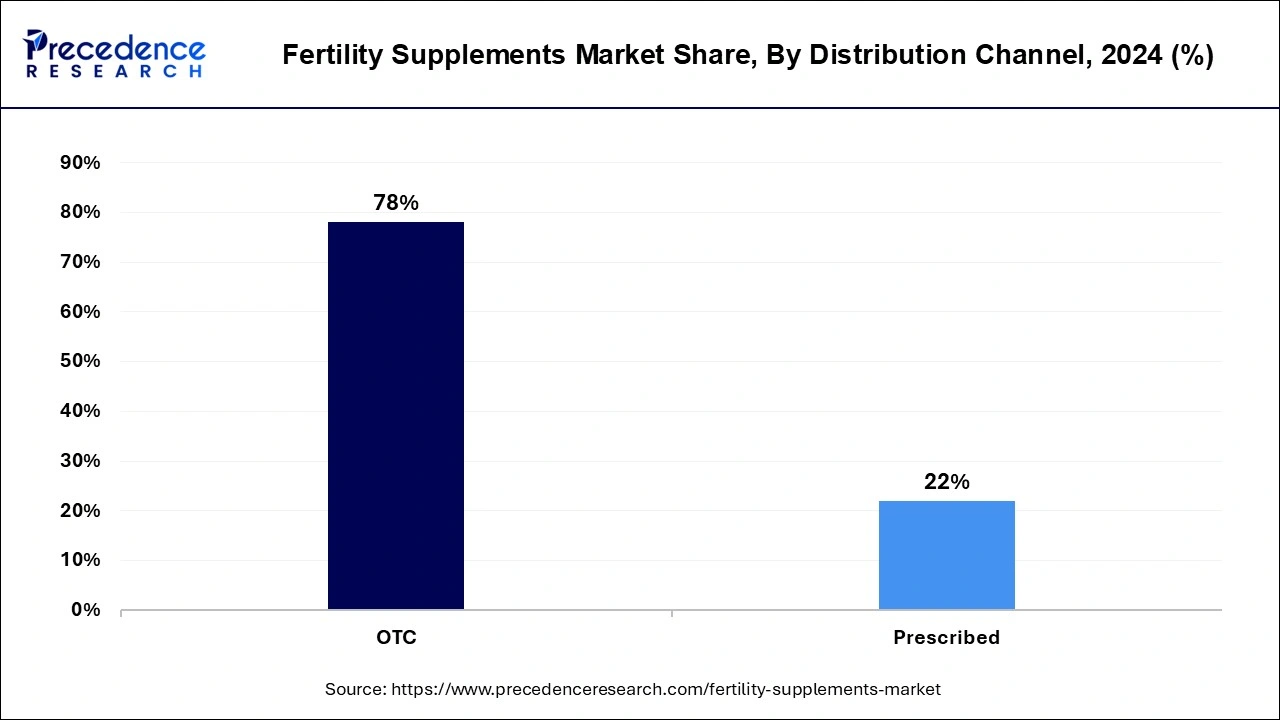
The prescribed segment is projected to show the fastest growth in the fertility supplements market during the forecast period. The growth of the segment can be driven by limited awareness among most people regarding fertility supplements. Furthermore, stringent government regulations imposed by governing authorities across the globe can impact segment growth positively.
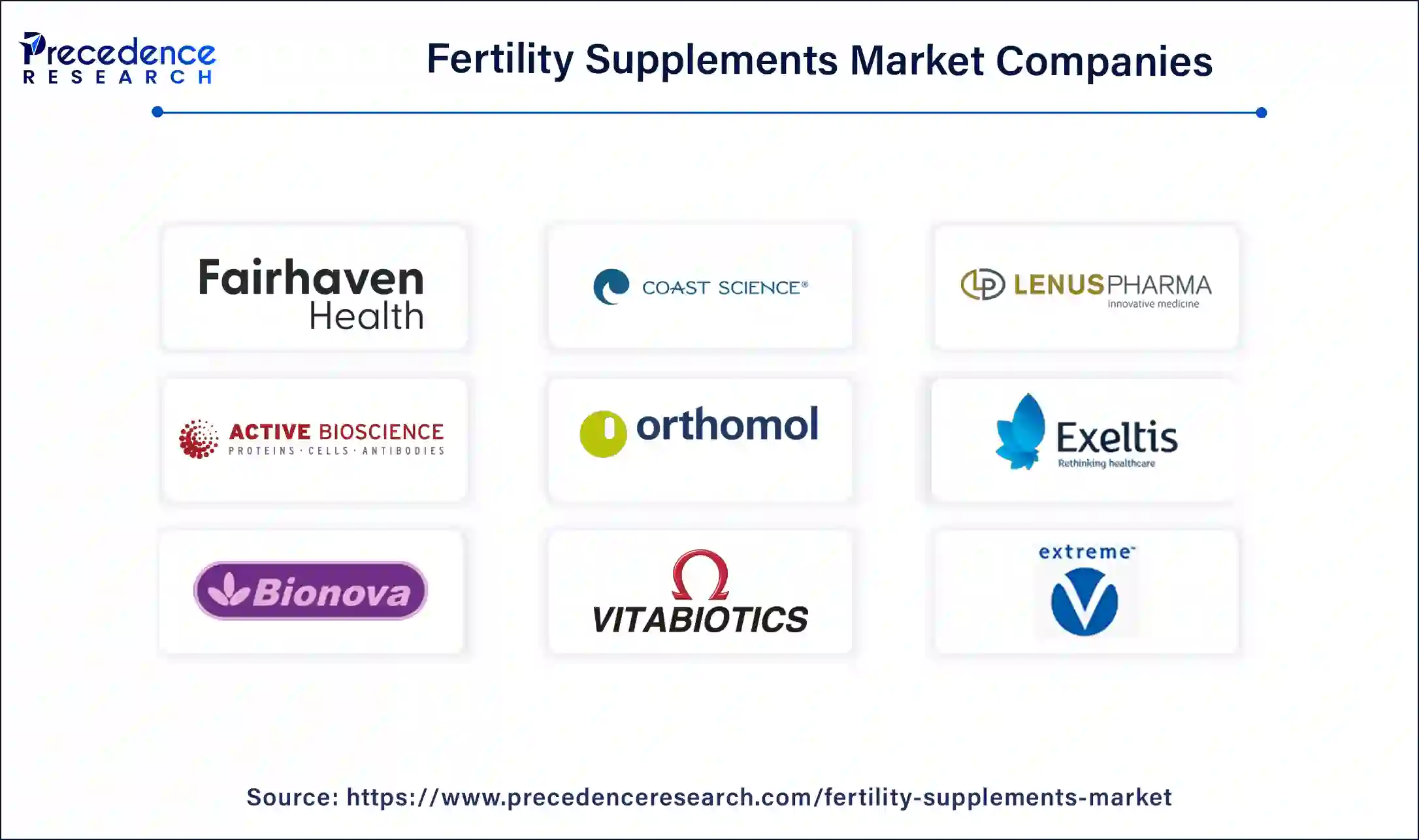
By Ingredient Type
By Product
By End-User
By Distribution Channel
By Geography
For inquiries regarding discounts, bulk purchases, or customization requests, please contact us at sales@precedenceresearch.com
No cookie-cutter, only authentic analysis – take the 1st step to become a Precedence Research client
March 2025
August 2024
October 2024
February 2025